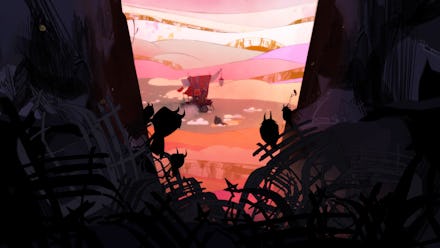‘Pyre’ doesn’t have traditional game overs — and neither should other RPGs

In 2014, the New England Patriots were boat raced on national television by my Kansas City Chiefs, 41-14. The dynasty was over, Tom Brady was washed up and the NFL was entering a new era, free from Bill Belichick’s reign of terror.
Only, that’s not what happened. The Patriots went on a tear, losing only two more games throughout the rest of the season and eventually winning one of the most thrilling Super Bowls of all time. “On to Cincinnati” became a rallying cry. This is a narrative you find with just about any championship sports team: After this one devastating loss, we searched ourselves and found what we needed to prevent it from happening again.
Supergiant Games has embraced that with Pyre, a fantasy sports RPG that lacks a traditional game over system. When you lose, the story keeps moving. As a fan of sports, and someone who can relate on a personal level, I’d like to see this embraced by more games in the future.
Pyre understands how sports narratives are supposed to work
I’m going to admit up front that I intentionally threw a match in Pyre in preparation for this piece. The opening hours of the game are not especially difficult, with this latest match being no exception. I stumbled around and let them win because I wanted to see what would happen.
I was pleasantly surprised that, both in a narrative and mechanical sense, Pyre treated the loss as a learning experience, a bump in the road on the way to the characters’ freedom — the in-game equivalent of winning the Super Bowl.
The three characters I used in the match each got a one-time generous experience boost for their troubles. Though their dialogue took a melancholy, defeated tone, the game used its mechanics to acknowledge that maybe this loss was somehow more valuable than an early-season victory would have been. They can use it to improve themselves as they move on to the next game.
This is one of the many ways in which Pyre is a game about sports rather than a sports game itself, as Rob Zacny eloquently put over at Waypoint. Of course, the circumstances here are more dire than those faced by a professional sports team, but many of the familiar dynamics of sports are still present. You can learn from one demoralizing loss, but you won’t get the same bonus again. Repeated losing tends to instill a culture of loss where lessons aren’t necessarily learned from each defeat anymore.
For a game about religion, exile and the demonization of literacy, Pyre understands the narrative of a sports season better than plenty of actual sports games.
For a game about religion, exile and the demonization of literacy, Pyre understands the narrative of a sports season better than plenty of actual sports games.
No compelling hero is undefeated
A traditional roleplaying game has the player directing a hero (and usually the hero’s buddies) through thousands of inconsequential battles against nameless enemies. These can get boring quickly, but if you don’t do them, your stats won’t be high enough to take on the next boss. Developers keep doing this because it works well enough, but I think the Pyre model could be adapted for other games.
What if the total number of battles in a Persona game, for instance, was reduced, but each battle was more difficult and more important to the plot? Like Pyre, you could lose them (perhaps save for big boss fights and such) and keep going, having gained something for your effort. After all, in these games, most battles exist to pad out your play time. Getting kicked back to the save file screen after losing one of them isn’t enjoyable.
Aside from the mechanical implications of such a system in a more traditional RPG, it could also help craft more realistic stories. It’s a matter of fact that, in both life and fiction, the best heroes have experienced loss on some level. Video game heroes only ever lose in cutscenes or boss fights you can’t win, a design standard so well-worn that savvy players will instantly figure out what’s going on when it comes up.
In both life and fiction, the best heroes have experienced loss on some level.
I want loss to be organic, something that’s baked into the moment-to-moment action of a game. Pyre doesn’t just succeed as a sports story, but as something we can all relate to ourselves. I’m personally going through some major setbacks at the time of writing, but it’s not going to stop me. I’m going to glean something from each loss and use it to reach even higher peaks than I reached before.
By eschewing the traditional “you’re dead, please try again” structure, Pyre crafts a more believable story than many of its peers. You may fuck up or otherwise not be at your best when you need to be, but that shouldn’t be the end.
More gaming news and updates
Check out the latest from Mic, like this deep dive into the cultural origins of Gamergate. Also, be sure to read this essay about what it’s like to cosplay while black, a roundup of family-friendly games to play with your kids and our interview with Adi Shankar, producer of the animated Castlevania Netflix series.